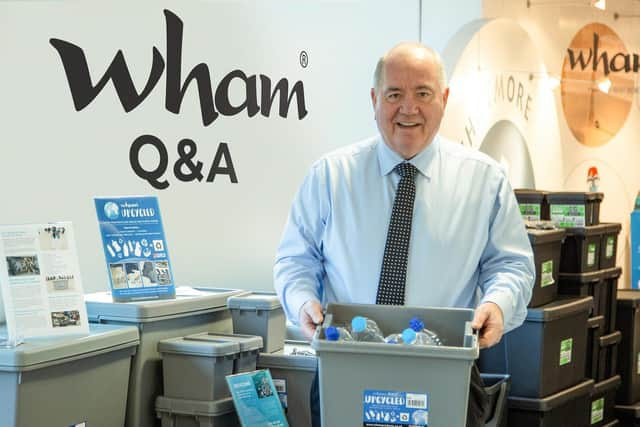Padiham export champion believes 'Brexit's short-term pains could be long-term gains'
and live on Freeview channel 276
What More UK, the Padiham-based firm behind the popular housewares brand Wham, sells its products in every major UK supermarket, 1,600 independent retailers and export to a further 75 countries.
Now the UK has officially left the EU, organisations are discovering the reality of the situation, with Tony Grimshaw OBE being well placed to talk about Brexit, sustainability, and British manufacturing.
Advertisement
Hide AdAdvertisement
Hide Ad"Brexit is a big change, and that's always difficult. There will be challenges along the way, but there will also be benefits," he said.


"From my experience, challenging situations can often be turned upside down, and seen as opportunities. Even if it isn't a direct business endeavour, it's still a chance to grow, to understand the world a bit better and move forward.
"At the moment, the problems are obvious. There's extra paperwork to contend with, new processes to go through, and there are new rules to interpret and apply. For now, in the immediate future, business will overcome these challenges. That's what successful businesses do. We deal with challenges on a daily basis."
Undoubtedly an "export champion", Tony also shared his feelings on the short and long-term impacts of Brexit on the country's exporters.
Advertisement
Hide AdAdvertisement
Hide Ad"It's all about short-term pains and long-term gains. The short-term pain is things like more paperwork, and rules to understand and apply. Over the longer term, we've got the freedom to set our own course, and you can't put a value on that.
"We're no longer dependent on 27 other countries to agree a course of action. In my experience, agreement on that scale is usually impossible, that leaves only compromise, and everyone is left feeling short changed."
Tony also addressed how manufacturing in the UK affect things like price and sustainability.
He said: "Investment is vital to keep British manufacturers competitive. The UK cannot compete with other economies where overheads are lower. British manufacturers have higher costs, in terms of wages, national insurance contributions, working conditions, quality control, health and safety.
Advertisement
Hide AdAdvertisement
Hide Ad"These are all costs that British manufacturers have to pay. Investment in people, production equipment and estate will all help to close the divide."
Sustainability and the environmental impact of industry is at the forefront of government thinking around the world at the moment, which Tony believes is one of the best ways that the UK can compete with other economies.
For a start, buying British means goods have less distance to travel to reach the consumer," he said.
"Here in the UK we use the latest technology to cut emissions, the latest fuels, and proper methods of waste disposal. That all adds up to a significant competitive advantage.
Advertisement
Hide AdAdvertisement
Hide Ad"British manufactured products are some of the best in the world, made to the highest standards with strict environmental controls. The UK is a brand in itself, and we're lucky that it's a brand people know and it inspires confidence.
"Brand UK is recognised, respected and envied all over the world. People want UK manufactured products and it would be rude not to supply them. I'm very confident that Brand UK is strong enough to stand on its own two legs, next to but apart from the EU."